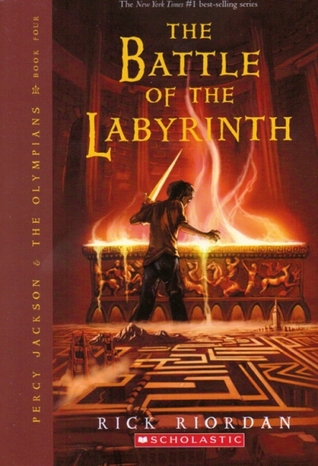As usual, I enjoyed reading more about Percy, Annabeth and Grover's adventures, along with Tyson. In this book, Annabeth leads the quest into Daedelus's labyrinth. Daedelus has always been a hero of Annabeth's with all of her love of architecture.
One of my favorite parts of this book was when Riordan poked fun at the educational system and testing via the Sphinx that will not let people pass without solving the riddle. Originally, you had to answer one riddle. Now it's 20 "Oh, we've raised our standards! To pass, you must show proficiency in all twenty. Isn't that great?" And then the Sphinx proceeds to ask trivia questions....and Annabeth is required to enter her answers onto the bubble sheet with a #2 pencil with all the instructions we're familiar with so the machine can grade the answers. Annabeth protests after the first question "What about 'What walks on four legs in the morning?'....the riddle about man. He walks on four legs in the morning, like a baby, two legs in the afternoon, like an adult and three legs in the evening, as an old man with a cane. That's the riddle you used to ask." "Exactly why we changed the test!" the Sphinx exclaimed "You already knew the answer." After a couple more trivia questions Annabeth protests again "Hold up!...These aren't riddles."
"What do you mean?...Of course they are. This test material is specially designed-"
"It's just a bunch of dumb, random facts. Riddles are supposed to make you think."
"Think? How am I supposed to test whether you can think? That's ridiculous! Now How much force is required-"
"Stop! This is a stupid test."
"Why then, my dear....If you won't pass, you fail. And since we can't allow any children to be held back, you'll be EATEN!"
Now isn't that interchange great? Now I'd venture to say, as a former full time teacher myself, that at least 98% of teachers know that standardized testing is one of the worst and least informative ways to test students for a knowledge of their learning. It's so limited in scope and design. However, we also know that the best ways to assess knowledge acquisition take a lot of time and can't be graded quickly either with a scantron machine. And no one seems to want to take this time, or in a teacher's position, they are simply not allowed to take the time to do this when they are required to drill students to be able to fill in a bubble sheet. Oral examinations, practical examinations (for instance, successfully carrying out a scientific experiment to illustrate you understand the concept of titration instead of answering questions about the steps to completing a titration), and obviously, some will require resources. It's simply harder to test whether a person can think vs whether a person can remember facts. And that's one of the biggest problems today, it's an insult not just to the "child of Athena's" intelligence, it's an insult to our children's intelligence on a whole. My 3rd grader told me she is already getting nervous about taking the standardized tests in March. Nearly 6 months away and my EIGHT YEAR OLD is getting test anxiety? And she's a bright student. *sigh*.
Anyhow, another big lesson learned in this book is that sometimes we've built up our personal heroes so much in our minds that if and when we meet them, it's a let down. We realize they have their faults and that they've made mistakes just like anyone else. We realize that sometimes they aren't always brave and won't always save the day. And that's ok. They can still be a hero in other ways. In fact, I think it makes people MORE of a hero when they admit to mistakes or apologize and try to right the wrongs they've done. And that, I believe is one of the best lessons taught.
Another question that is brought up and not fully resolved is the choice between what is right and wrong and family. Calypso is eternally punished because of what her father did in the Titan war against the Gods and the fact that she supported her Father. And she asks Percy if he supports the Gods because they are good or because they are family. It's an interesting concept. How loyal do you run with your family? Would you do something out of loyalty that you normally wouldn't, simply because "it's family"? It's definitely a thought worth dwelling on because everyone has different moral lines governed by various ideals. It's like in Gilmore Girls when Lorelai breaks up with Jason because he is suing her family and she states that she loves him, but can't be with someone who is suing her family. And it also brings up how there isn't always a clear line between good or not. While Percy acknowledges that the Gods don't always do good things and that they don't always show that they really care for their half-blood children, supporting them does seem to be a MUCH better alternative to letting the Titan's rule with their evil agenda. And thus, many of our choices in who will be the best leadership in our lives sometimes isn't a choice between the good candidate and the not so good candidate, but the lesser of the two evils. Which is also a worthy lesson to take away.
We also seem more of Nico's struggle to find his place as a son of Hades. Not quite welcome at camp Half-Blood, but not really belonging anywhere else, this poor young boy has so many inner struggles, it's amazing what he has to deal with. I look forward to learning more about him. And cheering him on to hopefully make the right choices as he's faced with them.
A page turner again that leaves you wanting more and more!

No comments:
Post a Comment